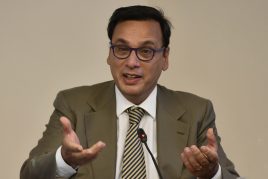
To mark its 160th anniversary, from July 1st to 5th, “L’Osservatore Romano” will issue five “special” supplements with articles written by the editors-in-chief of major Italian and international newspapers, thereby inaugurating a set of initiatives planned throughout this anniversary year, with additional special editions and events. Tomorrow the newspaper will feature a message written by the Holy Father. “The Pope reads the newspaper every day, from the first to the last page. And when it doesn’t come out he misses it. This is a huge responsibility for us, because it means that we do good things and we cannot afford any distractions”, says editor-in-chief Andrea Monda.

At the Angelus on the Solemnity of Sts Peter and Paul, has the Pope asked for “fidelity and creativity” from L’Osservatore Romano?
I must express my profound enthusiasm and gratitude to the Holy Father, who has encouraged and motivated me since my appointment. He humorously refers to us as a “Party newspaper”, but that is not what he wants. He asks for fidelity and creativity. In other words, freedom of expression, inclusiveness and the ability to engage in dialogue.
He demands more from a newspaper that has served as the most authoritative institutional news source for 160 years. This is a feature that must be preserved, ‘but at the same time we must be creative”
The connection between these two terms defines the nature of this ‘singular’ newspaper, as the then Cardinal Montini described it on the occasion of its centennial. This newspaper has no analogues: it is an institutional newspaper that represents the voice of a State and, at the same time, it chronicles the life of the Church and the ministry of the Holy Father.
Is it difficult to combine fidelity and tradition with creativity?
My aim since my appointment as editor-in-chief, has been to consistently propose a newspaper that explores issues, questions, debates and reflections. One such example is the Italian Saturday (“Sabato italiano”) column, that brings together a variety of views on the crisis of the Church. The Church is seeing a decline in religious practice, but this could be interpreted in many ways. There is great need for spirituality. The column on the theme of storytelling, for instance, features the contribution of international writers and artists belonging to world religions and faiths. Likewise the monthly supplement Women Church World (“Donne Chiesa mondo”) with its editorial board comprising women of different faiths.
An inclusive and dialoguing approach implies creativity, offering interpretative keys to the readers based on the words of the Pope.
Over the past two years I have been reporting stories featuring Church interventions to heal the wounds of suffering humanity in the “Field Hospital” column (“Ospedale da campo”). Being creative means offering insights to questions, not being content with the easiest answers. Stimulating the reader’s imagination and intelligence through the extraordinary richness of the Christian faith.
Even on controversial issues?
We must have the courage to address every issue, including difficult ones, and invite people to reflect together, not only Christians but all men and women of good will.
You have a privileged relationship with the Pope.
It is a gift I am grateful for. The Pope’s esteem for me and for the newspaper is the source of fruitful dialogue. Consider the story concerning Edith Bruck: after reading the interview published in L’Osservatore Romano, the Holy Father decided to meet her personally and asked me to organise the meeting, which subsequently developed into a story covered by the newspaper. This is the creativity that the Pope refers to: that meeting is more meaningful than most statements on the relationship with Judaism. Our newspaper wishes to report stories also through powerful images.
There is little room for abstract concepts, but plenty of room for stories and people.
This is the way of evangelising keeping in step with the times, harmonising creativity and fidelity. The role model is Jesus recounting parables. Stories that everyone can identify with.














